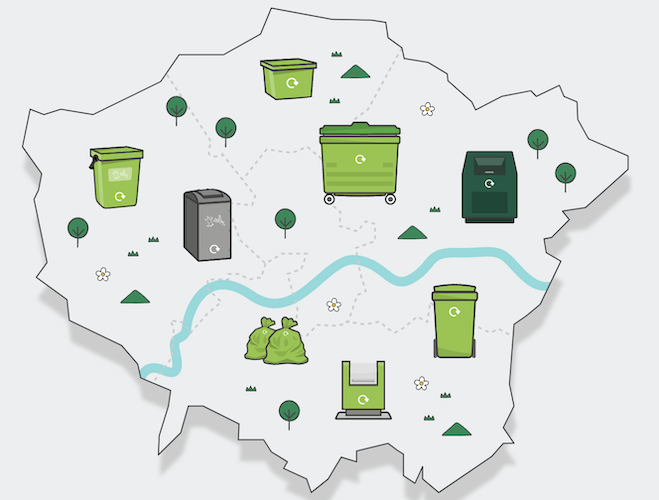London’s household recycling rates rose significantly between 2001 and 2011, but over the past 10 years they’ve been flatlining at around 33 per cent – well below Sadiq Khan’s target of 45 per cent of household waste being recycled by 2025, less than two years away. Have Londoners fallen out of love with recycling? What needs to be done to get it back on track?
Those were the questions posed by the London Assembly’s environment committee yesterday to a panel of waste management experts from across the capital.
The latest figures, which cover 2021/22 show a predictably mixed picture across the 32 boroughs. Top of the league Bromley recycles 49 per cent of its household waste, closely followed by Ealing and Kingston on 48 per cent, while Tower Hamlets and Westminster sit at the bottom of the table with rates of just 20 per cent and 21 per cent respectively.
The leafier suburban boroughs of outer London generally perform better, with the denser inner-city boroughs clustering around or below the average. And while “dry” recycling rates were respectable, it was the low rates of green waste and, in particular, food waste recycling which brought the overall rate down, the committee heard.
Collecting from the city’s large number of older flats on estates and above shops poses a continuing challenge, according to Ray Parmenter, policy head at the Chartered Institute of Wastes Management, who such such dwellings were “designed when recycling wasn’t thought about”.
Confirming this point, Islington Council waste strategy manager Matthew Homer said: “We are trying to retrofit for different waste streams in estates which were not built to accommodate them.”
Research and pilot schemes showed that performance could nevertheless be improved on estates, said Wayne Hubbard, chief executive of ReLondon, the statutory body formerly called the London Waste and Recycling Board set up under the GLA Act 2007 to promote waste reduction and recycling.
“Citizens will engage with recycling if they have the knowledge and the motivation and it is easy to do,” he said. With well-located facilities and frequent collections, including food waste facilities, rates would go up, he told he committee. “People do want to recycle. If you provide them with the opportunity, they generally will do it.”
But younger Londoners were still “difficult to engage and do not recycle as much as the average Londoner,” he said, while Parmenter added that, for food waste recycling, there was also still a “yuk” factor to be overcome – “people don’t want it in their kitchen”. Homer added that councils have no powers to require householders to recycle.
Nevertheless, all Londoners will be getting the chance to recycle their food waste by 2026 under long-awaited new government plans announced last month, the committee heard. The plans will make weekly collection of food waste mandatory for councils and therefore cover the eight London boroughs not currently offering a full food waste collection service.
The good news, said Hubbard, was that the new rules could see a significant increase in food waste recycling, heading towards or even reaching the Mayor’s 45 per cent by 2025 target. Investment in recycling had stalled while councils and waste companies waited for government directions, but that blockage was now lifted.
Tight government timetables would nevertheless put pressure on procurement, with half of England’s councils having to set up food waste collection services, which impose new vehicle and equipment requirements, including kitchen caddies and outdoor food bins – “A logistical nightmare to get it in by 2026,” commented Parmenter.
Greater London Authority waste chief Jemilah Bailey said City Hall continues to put the case for funding arrangements to recognise the particular challenges London faces.
Difficult questions are still to be resolved about the need for more anaerobic digestion plants, which produce biogas (a renewable energy source) from food and other organic waste in addition to the four plants already operating in the city – two in Dagenham, one in Islington and one in Kingston – which Mayor Khan supports, and about controversial new incineration facilities for residual waste, which he opposes.
Recycling should be regarded not as an end in itself but as a staging post on the journey toward net zero carbon emissions, cautioned Homer. “We have this relentless focus on meeting recycling targets, but to achieve our net zero carbon targets, which is the higher objective in all of this, we need to reduce waste. Recycling in some ways is the least effective thing if you want to reduce carbon emissions.”
Watch the Assembly committee session in full here. Image from London Recycles. X/Twitter: Charles Wright and On London. If you value On London’s coverage of the UK capital, become a supporter or a paying subscriber to editor and publisher Dave Hill’s personal Substack for just £5 a month or £50 a year. In return you will get a weekly London newsletter and offers of free tickets to London events.


Disappointing to hear that London is facing challenges in meeting the Mayor’s recycling targets. Recycling plays a crucial role in sustainable urban living, and it’s essential for both individuals and local authorities to actively contribute. Let’s hope for collaborative efforts and innovative solutions to overcome these hurdles and work towards a greener and more environmentally conscious London. Every small action counts towards a more sustainable future!